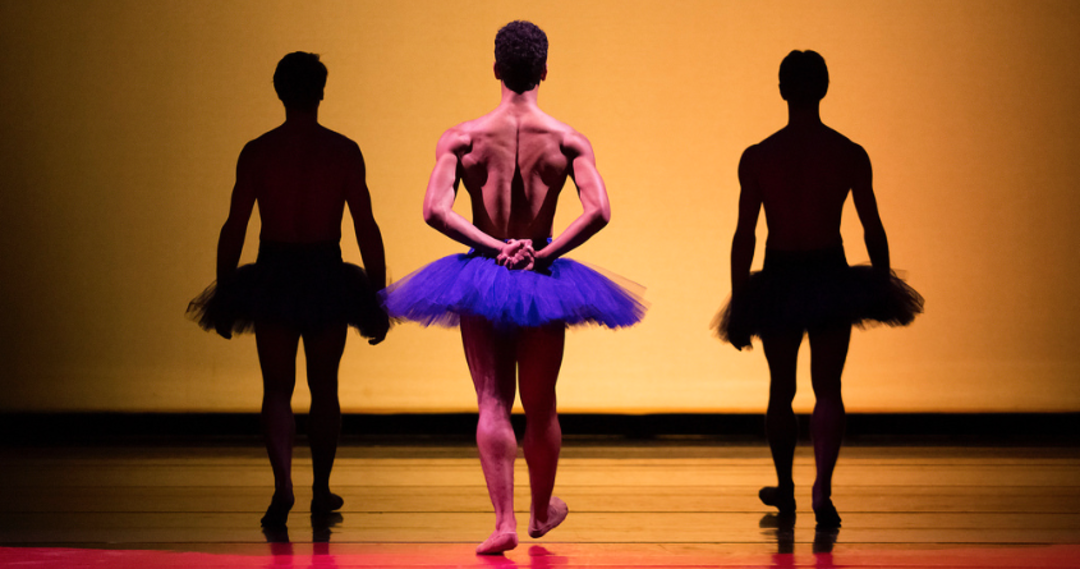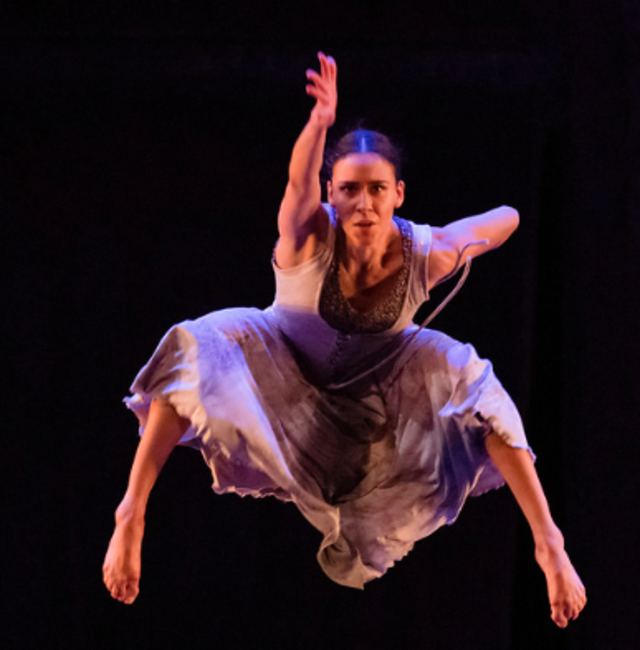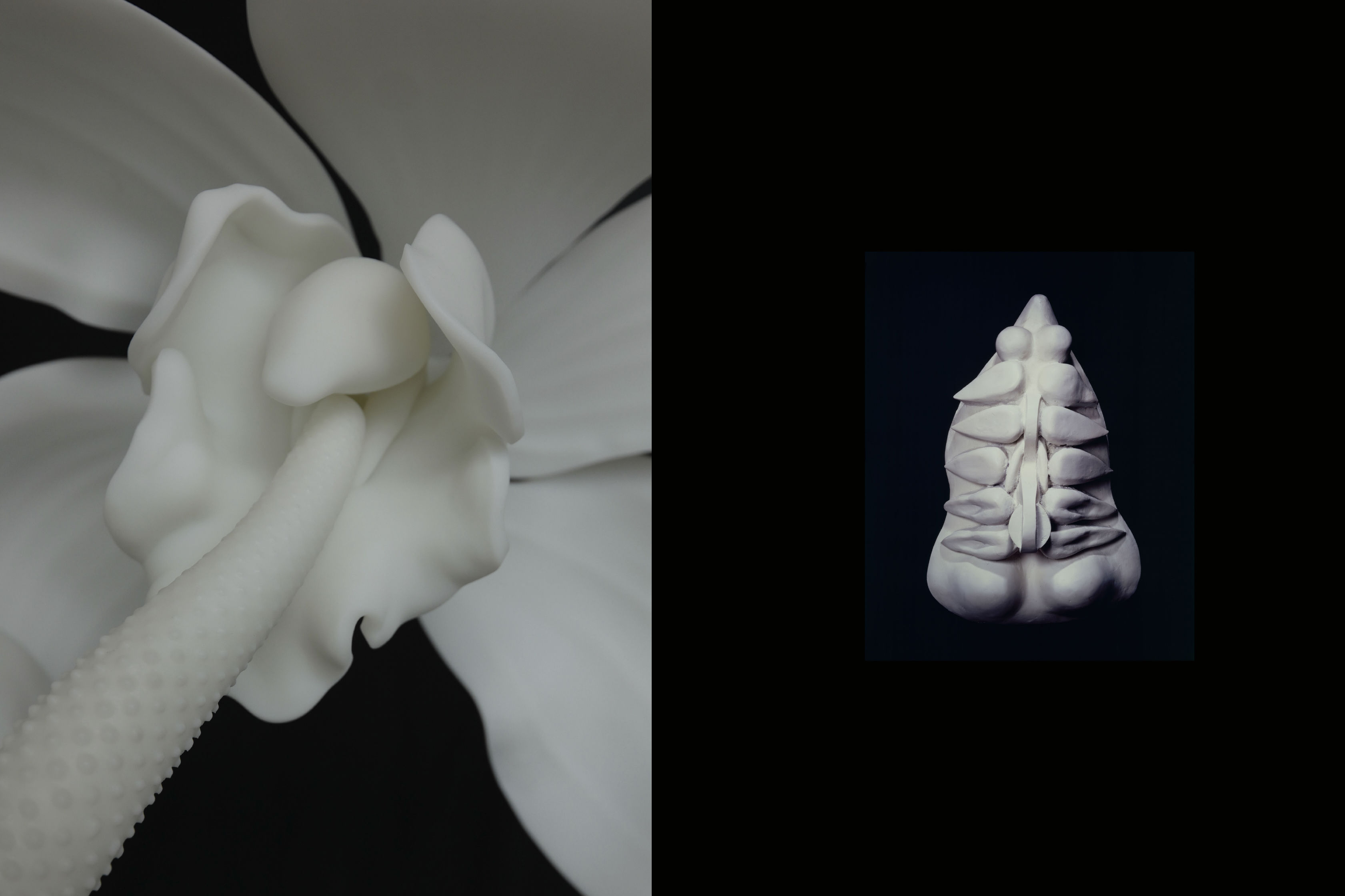Men in Tutus, Energy, and Experimentation in Oregon Ballet's IMPACT

Left to right: Michael Linsmeier, Jordan Kindell and Chauncy Parsons in the world premiere of Darrell Grand Moultrie's Instinctual Confidence. Photo by Blaine Truitt Covert
In IMPACT, Oregon Ballet Theatre's celebration of its 25th anniversary, tights are scarce, tutus appear only on men, and pointe shoes, though certainly in evidence, are not there to bolster any notion of female ethereality (as they so famously did in the 1832 performance of La Sylphide that cemented their place in ballet forever).
Instead, in the four ballets presented in IMPACT, we are confronted most noticeably with naked skin, the sounds of it being slapped and punched; we are given enough silence to hear the breathing of the dancers and the rhythmic pounding of their feet. It is a less luxurious and more immediate style of dance, one that does not shy away from the thematic cores of the pieces we see—the weightiness of historical tragedy in one case, the exuberance of youth and individual expression in another.
Back to those men in tutus. Darrell Grand Moultrie, Juilliard-educated choreographer to the stars—he's worked with Beyonce on her Mrs. Carter world tour—and celebrated "genre jumper," opens the show with Instinctual Confidence, and takes his opportunity to foreground the body's capacity and desire for experimentation. As the curtain rises, Xuan Cheng moves like a snake struggling magnificently to wriggle out of its skin and become something new; later, when three male dancers appear clad in nothing but cobalt tutus, the effect is novel (but feels surprisingly natural).
Heavy-handed commentary on femininity or sexual politics is surprisingly absent from Moultrie’s use of ballet's most feminine—and feminizing— garment. Bare-chested and ringed by tulle, the dancers exude a youthful energy to explore their bodies and an understated, masculine joyfulness that leaves them glowing.

Sarah Griffin in the Oregon Ballet Theatre company premiere of Nacho Duate's Rassemblement. Photo by Blaine Truitt Covert
In contrast, Nacho Duato’s Rassemblement is very much an attempt to grapple with the social and political, in this case the significance of Haitian slavery. The dancers, costumed in ragged dresses and work pants, grow together and are torn apart under the sign of a huge, off-kilter cross dripping with what looks like blood. This gigantic backdrop is at once diaphanous and menacing, as if to suggest that, at the scene of slavery, something has gone cosmically, spiritually askew.
Despite the striking set design and choreography that is affecting, beautiful, and nuanced, the overall effect at times tips into histrionic—I wondered whether the goal was to make suffering so florid that it illuminates and, if so, whether this could shade into a type of guilt-extirpating sadism (or reductionism) for the audience. The music, by Haitian singer Toto Bissainthe, has a strongly rhythmic and emotive quality that leaves space for the contemplation of such difficult questions.
Sandwiched in between these two heavy-hitters are Dennis Spaight’s Crayola and Nicolo Fonte’s Presto. In Crayola, six young women (chosen from among the company’s apprentices and school), each in her own brightly colored dress, dance without any musical accompaniment other than the rhythm of their pointe shoes striking the stage. In the high-energy Presto two couples in silver and pastel blue perform intriguing lifts and allow their bodies to find unusual angles.
There may be Balanchine at OBT (and who doesn’t have a soft spot for The Nutcracker?), but there is no Balanchinism. OBT is clearly reaching out, taking steps to appeal to a wider audience, and taking the risks necessary to make itself relevant in the turbid waters of cultural criticism. Although ultimately, and perhaps purposefully, a little scattered—as a unifying theme, the word "impact" at times falls short—the show certainly presents its dancers as precise, athletic, musical, and bursting with energy. It also shows the audience that ballet can productively straddle the line between tradition and the more personal visions that sometimes challenge it. Here’s to 25 more years.
IMPACT plays at the Newmark Theatre through April 25.




